
Oscar-wise, Saoirse Ronan is an interesting case study. The Irish actress was only thirteen when she got her first nomination for her supporting turn in 2007's Atonement. From the start, she was seen as a prodigy, a young performer of uncommon talent and even rarer maturity whose characterizations seemed wise beyond their years. Still, one could have easily believed Ronan would go the way of other Oscar-honored child actors, fading into obscurity or just falling off AMPAS' radar. As luck would have it, things turned out differently.
Ronan shares with Jodie Foster (nominated at 14), Sal Mineo and Natalie Wood (both nominated at 17) the honor of being the only underage Oscar nominees to be nominated again in adulthood. This year, Saoirse is back in the conversation thanks to Francis Lee's introspective Ammonite, though the picture's somewhat cold reception and austere nature might repel the Academy. In the past, Ronan's been lucky, conquering nods nearly every time she was in contention – Atonement, Brooklyn, Lady Bird, Little Women. Still, no lucky streak is perfectly continuous and without bumps. Just look at 2009's The Lovely Bones…
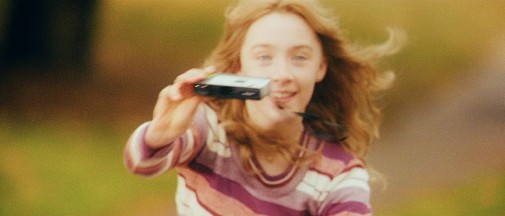
Adapted from a novel written by Alice Sebold, The Lovely Bones tells the story of Susie Salmon, a fourteen-year-old American girl who's raped and murdered by a neighbor on December 6th, 1973. Combining a crime thriller with whimsical meditations on the afterlife, Peter Jackson's movie cuts back and forth between Susie's existence in limbo and her family's reckoning with loss as the years go by. The book is one of those literary creations whose specificities defy cinematic translation, though one can imagine a bold cineaste making a grand project with the material.
We can conjecture how Lynne Ramsay, a name attached to the movie in its early days, may have been able to accomplish such a miracle. Jackson, however, isn't as fortunate. His vision of the tale is a mismatch of conflicting tones, both frenetic and tiresome, too anonymous in its style while simultaneously overstuffed with tacky CGI excess. The emotional skeleton of Susie and the Salmons' woes is still somewhat visible beneath the digital clutter, but several disjointed elements pull the flick down towards the depths of mediocrity.
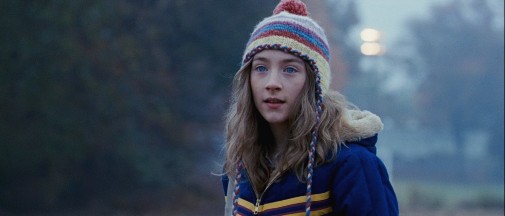
One of those unfortunate facets is Stanley Tucci's take on the murderous antagonist. It's a performance of cartoonish one-dimensionality, though, to be fair, most of the cast is also going big (to their detriment). This is true about Susan Sarandon's drag-tastic take on an alcoholic grandmother and Mark Wahlberg's fussy gradations of grief souring into an obsession, among many others. Only one performer leaves the picture unscathed by its miseries and that's Saoirse Ronan as the protagonist.
In many ways, Ronan is tasked with the impossible duty of anchoring Jackson's flights of fancy into digital and aesthetic purgatory. She's the one who grounds The Lovely Bones on the big screen and forcefully pulls a couple of unearned tears from the spectator. All that and she must, at all times, fight the worst impulses of her writer and director. This is noticeable right from the start when Ronan must establish Susie's living self through an impressionistic collage of hurried scenes.
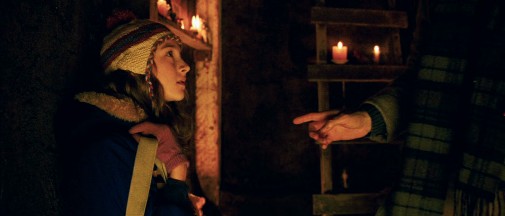
With luminous smiles and hints of conspiratorial fun with her dad, Susie is quickly fleshed out to us. The writing is more than a bit generic, coming off as an adult's idea of a sunny teenager rather than the real deal. Ronan, however, shades the youthful radiance with hints of ugly petulance, the overexcitement of a schoolgirl's crush, the boredom that comes with too much energy and too little to spend it on. It's no great feat of characterization, but it gets the job done, setting emotional stakes that will come into play once Susie leaves a void in her place after brutal violence takes her life. The scene preluding that murder is her best acting in the whole picture, an innocent lamb realizing its slaughter is near.

From then on, Ronan is completely untethered from the mundane reality of the main storyline, her role's demands evolving. Before, she had to breathe authenticity into wisps of barely sketched out narrative. Now, she must play against a scenery of increasingly abstract imagery, clumsily moving through a dream of evanescing materiality. Early on, she gets some of her better moments, reacting to the out-of-body experience of being murdered, running in mindless panic, screaming, emptying herself of feeling in an explosion of anguish. She plays it as if she were in a horror movie, a final girl who didn't live to the end.
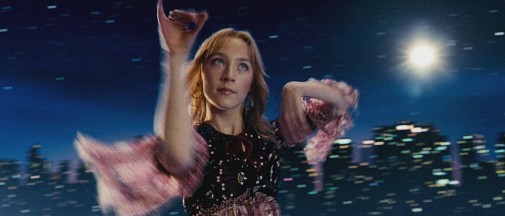
Confusion gives in to denial, anger, hedonistic enjoyment of the afterlife's otherworldly possibilities, a bittersweet joy that unexpectedly turns into anger, fury decomposing into sorrow, and, at last, transmogrifying into acceptance. All this reveals itself in Ronan's shifting expression though her transformations are interspersed within a torrent of bright-colored fantasy. They are lost amidst a cinematic idiom that has no interest in helping her to telegraph her character arc. Instead, the actress slogs her way through unrelenting dreamscapes, always walking inertly, her arms dropped at her sides unless she's sprinting or dancing.
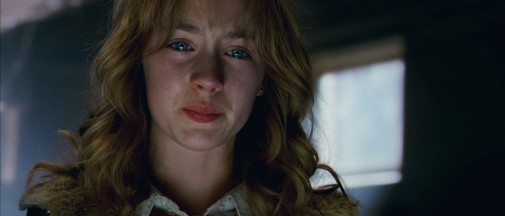
I wish I could like Ronan's work more, but she's continuously sabotaged by her own picture. Often, one sees glimpses of a fascinating star turn like when she observes a romance blossoming and chooses to project elation over sisterly jealousy, or when the actress lets her blue eyes shift from terror to unreadable blankness upon seeing the box containing her defiled remains. At least, she gets one last scene to show her talents and, thankfully, the camera calms down enough to witness Susie's first and only kiss. There, in that teary smile, nervous hands, and weary resignation, we see a whole new universe of bruising humanity, an oasis in this cinematic desert.
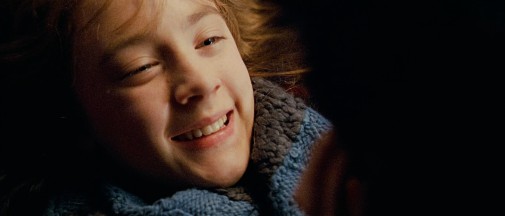
The Lovely Bones was highly anticipated and appeared in many people's predictions before anyone had seen it. Once critics took a look, its Oscar hopes dwindled, crushed under the weight of rightfully hostile reviews. Still, Ronan and Tucci were often singled out as the project's saving graces and such sentiment was reflected in terms of awards. He'd go on to snag his only Academy Award nomination to date, while she won considerable precursor buzz. She received Best Actress nods from BAFTA and the BFCA, and won a bunch of Young Actor prizes along the way.
In the end, that wasn't enough for her to crack into AMPAS' lineup. Instead, the Academy chose Sandra Bullock in The Blind Side, Helen Mirren in The Last Station, Carey Mulligan in An Education, Gabourey Sidibe in Precious, and Meryl Streep in Julie & Julia. As we all know, Bullock won for her blockbuster Best Picture nominee. Honestly, I can't say Ronan deserved to score herself a nomination for The Lovely Bones but, if she had, Mirren would have probably been the one left out. Would you have preferred that outcome?
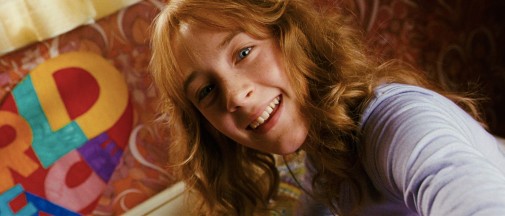
The Lovely Bones is streaming on DirecTV and Cinemax. You can also rent it through most services.